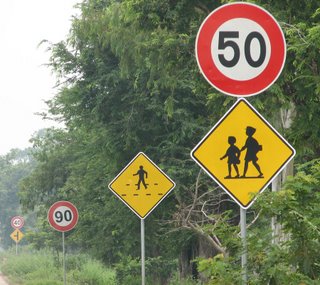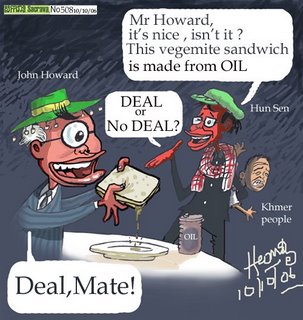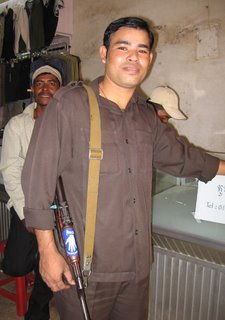Dear friends and enemies, I have finally joined the online community. If I had done this 2.5 years ago I would no doubt have had a bounty of witty and insightful anecdotes about living in Cambodia. Instead readers will have to make do with potted descriptions of my final few months here, and then a cavalcade of self-indulgent posts as
Anth and I traverse the globe and end up in South America in search of work in late 2007. I have no idea who often I will update this blog, or what sort of form it will take, so please bare with me. I hope that I am not as neglectful in updating this as I am at sending emails to those I care about.
For those of you that need a potted history of my last few years post university and public service in Canberra (which I left in mid 2002), I spent most of 2003 working for a
Monash International Projects a small unit within Monash University in Melbourne that managed small AusAID and Asian Development Bank projects within the region. It was the sort of job that sounded much more interesting than it actually was, and most of my days were spent writing proposals for projects that we never won or writing CVs for and negotiating with self important over-paid consultants (quite ironic that I have now joined this band of merry mercenaries myself). I was left with the firm conviction that the vast majority of interesting work in international development occurs outside developed countries. Post Monash I had a short - but professionally and ethically interesting – stint at
Marie Stopes Australia. Due to a combination of declining client numbers and my reluctance to accept an offer of an additional 9 months employment I found myself without a job in February 2004 (one consolation is that I was the first employee with the dubious distinction of being given 4 weeks notice and not fired immediately). This left with me no choice but to follow through on the itchy feet that had been plaguing me since teaching at
Xiangtan Normal University in 1999. 6 weeks later I ended up in Cambodia....
...which is where I have been since. A week after arriving I started working as a volunteer with an American NGO called
Pact – where I have also been ever since. In the last 2.5 years I have done consultancy work for Population Services International (primarily evaluating their network of franchised private healthcare providers) and also volunteer work for local rural development Non Government Organisations (NGOs) and conservation NGOs (such as
this one). My main gig though, has been with Pact. I spent my first few months working with the HIV/AIDs program that developed the first materials in Cambodia directly targeted at people living with HIV/AIDs, before moving on to temporarily manage Pact's Decentralization program. In this time I have written, edited and designed a lot of publications – all extremely frustrating, time-consuming but ultimately rewarding pursuits (the most recent one that have I worked on is a
handbook for village level advocates).
For the last year and a bit, I have been working with Pact's
anti-corruption program. My main job has been designing and implementing an education and behavior change campaign. Early on in the process we developed a brand called the "Clean Hand" as a symbol for anti-corruption activities. The hand itself was blatant lift from the
UN Convention Against Corruption, but it also draws upon local Khmer traditions - the white represents purity, and the blue background represents wisdom. The hand has several additional symbolic meanings: a clean hand that is free from corrupt money; a symbol of wisdom in Buddhism; saying “Stop!” to corruption; and reaching out our hands to work together. Luckily for us, the brand seems to have resonated with people, and stickers featuring the brand are now feature on a large proportion of motorbikes and other miscellaneous items across the country.
Other activities that we have been busy with include a symbolic Clean Hand Treaty that has been signed by over 110,000 people, a bunch of concerts and forums for Anti-Corruption day last December, a song and drawing competition for school children, and sponsoring boats at the annual Water Festival (when the population of Phnom Penh doubles in size with visitors coming to watch the boat races). We are currently working with a local NGO to develop a comic book for youth and erecting about 50 Clean Hand billboards. I doesn't sound like much, but believe me – each one of these feels like a minor victory when you consider the extreme inertia, aversion and paranoia that we induce from the Cambodian government whenever the word corruption is mentioned.
So... the above hagiography pretty much leads us to the present. Needless to say I have experienced and learnt a LOT in the last 2.5 years, but I don't know where on earth I would start in elucidating them. Hopefully though, there is enough background for anything I may post in the future. Thanks for reading.








